“The Long Life of a Tiny Companion: Chihuahua Dog Lifespan Explained”

The Chihuahua may be the smallest dog breed in the world, but when it comes to lifespan, it stands among the longest-lived of all dog breeds. These pint-sized pups are known for their lively personality, loyalty, and distinctive appearance, but many prospective pet owners are especially drawn to them for their remarkable longevity. This article provides a comprehensive look at the Chihuahua’s average lifespan, the factors that influence it, common health issues, and tips on extending their lives with proper care.
Average Lifespan of a Chihuahua
Chihuahuas typically live between 12 and 20 years, with many reaching their late teens and a few even celebrating their 21st birthday. This makes them one of the longest-living dog breeds on the planet. The vast range depends heavily on genetics, lifestyle, and overall health care.
Factors That Influence Lifespan:
- Genetics: Chihuahuas from healthy bloodlines often live longer.
- Size: Smaller dogs usually outlive larger breeds.
- Diet and Exercise: Nutrition and activity level greatly impact longevity.
- Healthcare: Preventative vet care and vaccinations matter.
- Environment: Safe, low-stress homes extend lifespan.
Lifespan Based on Type
Chihuahuas come in two coat varieties—smooth coat (short-haired) and long-haired—but this does not significantly affect lifespan. However, there is some difference between apple-head and deer-head Chihuahuas:
- Apple-head Chihuahuas may have more health issues due to skull shape, possibly shortening lifespan slightly.
- Deer-head Chihuahuas generally have fewer breathing issues and may live longer.

Common Health Issues in Chihuahuas
Although Chihuahuas can live very long lives, they are susceptible to specific breed-related health conditions:
- Heart Disease: Especially mitral valve disease in older dogs.
- Dental Problems: Due to their small mouths, dental disease is common and can affect organs if untreated.
- Hypoglycemia: Especially in puppies—can be life-threatening if not addressed.
- Tracheal Collapse: A common problem in toy breeds affecting breathing.
- Luxating Patella: Dislocated kneecaps, which can impact mobility.
- Obesity: Even slight weight gain affects their tiny frame and lifespan.
- Hydrocephalus: A condition where fluid builds up in the brain, more common in apple-head types.
Signs of Aging in Chihuahuas
Like humans, Chihuahuas go through aging processes, often visible around 10–12 years old:
- Graying around the muzzle and eyes
- Decreased energy and playfulness
- Cloudy eyes (possible cataracts)
- Hearing loss
- Increased napping and sleeping
- Weight gain or loss
- Joint stiffness or arthritis
How to Extend Your Chihuahua’s Lifespan
With proper care, Chihuahuas can live long, happy lives. Here are expert-recommended tips:
1. Proper Nutrition
- Feed high-quality dog food tailored to small breeds.
- Avoid table scraps, bones, and toxic foods (e.g., chocolate, grapes).
2. Regular Exercise
- Short daily walks and play keep weight in check.
- Don’t overdo activity—tiny joints are delicate.
3. Dental Care
- Brush teeth regularly.
- Provide dental chews or vet-approved oral solutions.
4. Veterinary Visits
- Annual checkups (twice a year for seniors).
- Routine vaccinations and parasite control.
5. Spaying/Neutering
- Can reduce the risk of certain cancers and increase lifespan.
6. Warmth and Safety
- Due to their small size, Chihuahuas are sensitive to cold.
- Provide sweaters, warm bedding, and indoor safety.
7. Mental Stimulation
- Puzzle toys and training help keep the brain active.
Notable Long-Lived Chihuahuas
- Many Chihuahuas have made headlines for living beyond 20 years, thanks to excellent care and healthy genes.
- One notable example is Megabyte, a Chihuahua who lived to be 20 years and 265 days.

Conclusion
The Chihuahua’s long lifespan makes it a perfect pet for those seeking a loyal, long-term companion. While their tiny size comes with certain health vulnerabilities, early veterinary care, a balanced lifestyle, and regular attention can help your Chihuahua live a vibrant, joyful life well into their late teens—and maybe even beyond. Owning a Chihuahua isn’t just about having a pet; it’s about sharing life with a tiny friend who sticks around for the long haul.




